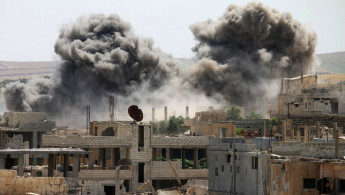Russia, Turkey, Iran agree on 'safe zone' for Syria's Idlib
Russia, Turkey and Iran have agreed on the borders of the safe zone for Idlib for an initial six months, negotiators for the three nations said in a joint statement on Friday after talks in Kazakhstan.
The three powers also agreed to post observers at the zones, the Turkish foreign ministry added, with a mission to prevent clashes between "the [Syrian] regime and the opposition forces, and any violations of the truce".
Russian negotiator Alexander Lavrentyev said Russia, Iran and Turkey will each send about 500 observers to Idlib province, and the Russians will be military policemen.
Idlib province, in northwest Syria on the border with Turkey, is largely under the control of a rebel alliance spearheaded by the former al-Qaeda offshoot Nusra Front.
"This announcement of a de-escalation zone in Idlib constitutes the final stage of the realisation of the memorandum signed in May," the Turkish foreign ministry said, adding that the May accord had brought a significant decline in violence.
"With this latest development, the memorandum is making a significant contribution to providing necessary conditions to further the political solution process going on in Geneva under UN monitoring."
Russia and Iran have been strong supporters of Assad during the six-year-old conflict, while Turkey has backed some of the rebel factions who fought to overthrow him.
Partitioning
Critics have described the plan as de facto partitioning of Syria, but the three nations said on Friday the zones were temporary, although their existence could be extended beyond the initial six-month term.
In a joint statement made in Astana, the three nations said that "under no circumstances the creation of the above-mentioned de-escalation areas undermine the sovereignty, independence, unity and territorial integrity of the Syrian Arab Republic".
The Syrian conflict began when the Baath regime, in power since 1963 and led by Assad, responded with military force to peaceful protests demanding democratic reforms during the Arab Spring wave of uprisings, triggering an armed rebellion fueled by mass defections from the Syrian army.
According to independent monitors, hundreds of thousands of civilians have been killed in the war, mostly by the regime and its powerful allies, and millions have been displaced both inside and outside of Syria.
The brutal tactics pursued mainly by the regime, which have included the use of chemical weapons, sieges, mass executions and torture against civilians have led to war crimes investigations.





 Follow the Middle East's top stories in English at The New Arab on Google News
Follow the Middle East's top stories in English at The New Arab on Google News
![The UAE is widely suspected of arming the RSF militia [Getty]](/sites/default/files/styles/image_330x185/public/2024-11/GettyImages-472529908.jpg?h=69f2b9d0&itok=Yauw3YTG)
![Netanyahu furiously denounced the ICC [Getty]](/sites/default/files/styles/image_330x185/public/2024-11/GettyImages-2169352575.jpg?h=199d8c1f&itok=-vRiruf5)
![Both Hamas and the Palestinian Authority welcomed the ICC arrest warrants [Getty]](/sites/default/files/styles/image_330x185/public/2024-11/GettyImages-2178351173.jpg?h=199d8c1f&itok=TV858iVg)